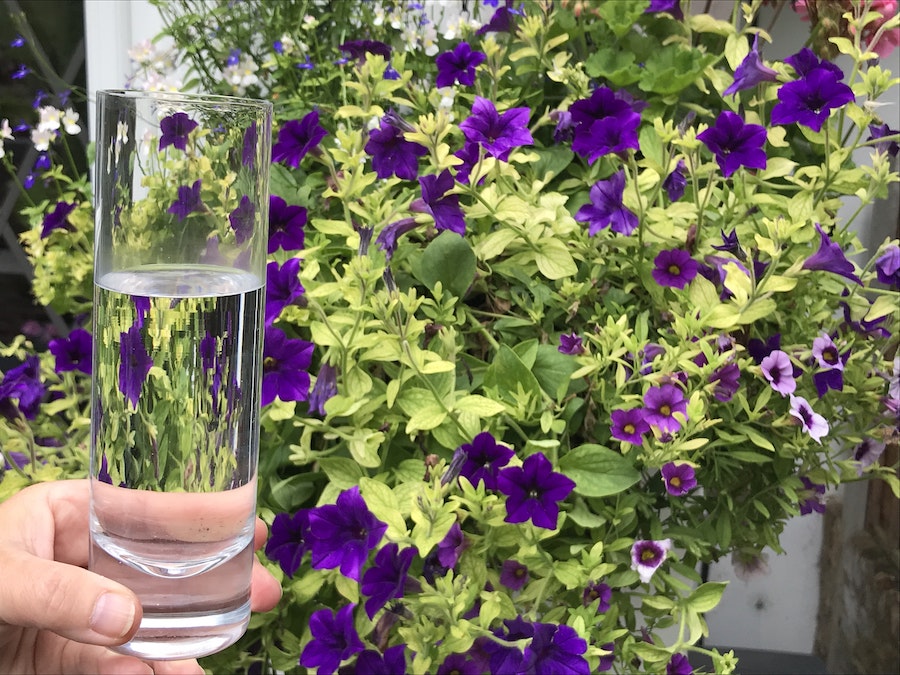Will your hanging basket survive on a glass of water a day?
Hanging baskets are being put to the test this summer as the RHS experiments with how best to water them.
The charity’s recently recruited garden water scientist Janet Manning will trial 10 different watering techniques over the next three months to determine how you can achieve dazzling blooms with minimum water use.
A previous RHS study suggested that baskets and containers can survive on a glass or teacup of water a day – just 160ml or 6floz – with overwatering likely to lead to poor quality plants.

Research suggests our hanging baskets need less water than expected
Hanging baskets, being raised above the ground, are notoriously difficult to water, with much of what is applied running out of the bottom and the exposed root ball losing moisture far quicker than its equivalent in the ground.
Don’t assume that rainwater will do the watering for you, especially with hanging baskets which are often sheltered by overhanging roof guttering or a porch. You’ll still need to check them regularly to make sure they’re moist enough.
Janet Manning offers five top tips to keep your baskets blooming summer-long.
1. Don’t (necessarily) give them a daily soaking

You may not need to get the hosepipe on them every day
Plants arranged in baskets lose moisture from their roots far quicker than their equivalents in the ground but there’s no need to provide them with a daily soaking, says Manning.
RHS research has shown that they can survive on as little as a teacup of water a day – that’s just 160ml or 6floz – with overwatering likely to lead to poor quality plants.
Maintaining a little bit of moisture is important – if they dry out completely they are really difficult to re-wet. It’s like trying to absorb a spill with a really dry mop. It just doesn’t work until it’s slightly damp. Familiarise yourself with the weight of your basket – if it’s feeling light it likely needs watering.
2. Slow down watering

Water plants more slowly
The same RHS research found that water applied 5cm (2in) below the soil surface, through subsurface irrigation with drippers placed through the holes on the side of the containers, increased plant quality even though the upper soil was dust-dry.
If you don’t have a subsurface irrigation system, slow down the watering. Pour the water on slowly to give the compost a chance to absorb the water, rather than have it all run off the surface or down the sides of the container. It’s easier to use a smaller watering can on hanging baskets as it’s lighter to lift.
3. Capture run-off

Capture run-off water
If you’re still inclined to give your baskets more than a glass a day consider placing pots under your baskets to capture any excess run-off. This also means you will capture the nutrients that would have escaped, so saving on feeding.
4. Go for drought-tolerant plants
Who doesn’t love a billowing basket? But covering the soil surface with flowers and foliage can also help prevent the soil being exposed to the sun and drying out. Of course, opting for drought-tolerant plants like succulents will also help you to conserve water and mean you can leave your baskets largely unattended while you holiday. Always opt for a good quality peat-free compost as they will have better water holding capacity.
5. Recycle grey water

Recycle grey water
In times of drought, recycle grey water – that is, leftover water from the kitchen sink, shower and bath – on the garden, always avoiding edibles, to be safe.
To minimise bacterial growth, save grey water for no more than 24 hours and apply it by watering can; grease and fibres can clog irrigation systems.
The Press Association
Latest posts by The Press Association (see all)
- 5 new books to read this week - November 23, 2024
- 3 easy Mary Berry recipes to make this season - November 22, 2024
- In Pictures: Party stalwart kept New Labour in touch with traditional supporters - November 21, 2024
- 6 easy indoor exercises to try this winter – and why they are good for you - November 19, 2024
- Martin Clunes: I can’t afford to retire – I’ve got too many horses - November 19, 2024





















